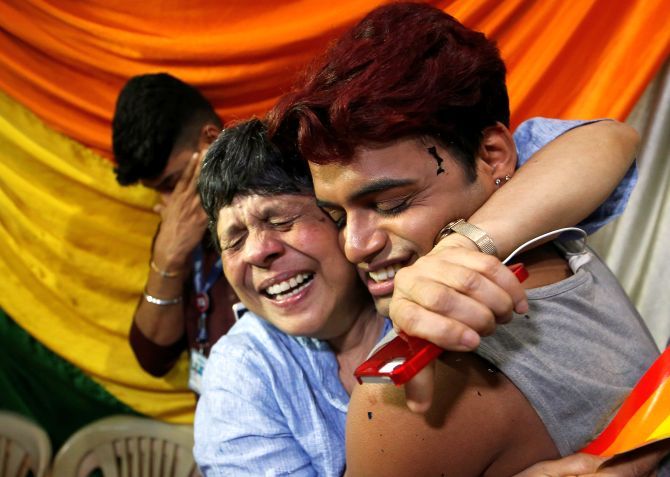Delivering a landmark judgment decriminalising gay consensual sex, Chief Justice of India Dipak Misra said: "I am what I am. So take me as I am."
Homosexuality is no longer a crime in India, five Supreme Court judges on Thursday ruled in a consensus judgment.
These are the main takeaways from the verdict.

IMAGE: People belonging to the LGBT community celebrate after the Supreme Court's verdict of revocation of Section 377 in a Mumbai NGO. Photograph: Francis Mascarenhas/Reuters
1.
Section 377 IPC, so far as it penalises any consensual sexual relationship between two adults, be it homosexuals, heterosexuals or lesbians, cannot be regarded as constitutional
2.
Engaging in any kind of sexual activity with an animal, however, would be a criminal offence under Section 377
3.
Non consensual gay sex will continue to invite penal liability under Section 377 of the IPC
4.
Part of Section 377, which prohibited sexual relationship between consenting adults of the same sex, was violative of the right to equality and the right to live with dignity
5.
Section 377 was "irrational, indefensible and manifestly arbitrary"
6.
History owes an apology to the members of LGBTQ community and their families, for the delay in providing redressal for the ignominy and ostracism that they have suffered through the centuries
7.
Section 377, so far as it criminalises even consensual sexual acts between competent adults, fails to make a distinction between non-consensual and consensual sexual acts of competent adults in private space which are neither harmful nor contagious to the society
8.
Section 377 subjects the LGBTQ community to societal pariah and dereliction and is, therefore, manifestly arbitrary, for it has become an odious weapon for the harassment of the LGBTQ community by subjecting them to discrimination and unequal treatment
9.
Section 377 used as a weapon to harass the members of the LGBTQ community, resulting in discrimination
10.
Due to Section 377, the LGBTQ members were forced to live in hiding and as second class citizens, while the others used to enjoy the right of sexual orientation
11.
LGBTQ community possess the same constitutional rights as other citizens of the country
12.
Sexual orientation is a "biological phenomenon" and is "natural" and any discrimination on this ground was violative of the fundamental rights
13.
Morality cannot be martyred at the altar of social morality and only constitutional morality can allowed under the rule of law
14.
Imposing sanctions of law on consenting adults involved in a sexual relationship has lent the authority of the state to perpetuate social stereotypes and encourage discrimination
15.
Homosexuality is not a mental disorder and homosexuals have a fundamental right to live with dignity
16.
Section 377 was the product of the Victorian era morality and there was no reason to continue with it especially when it enforces Victorian morale on the citizens of the country.
17.
Consensual carnal intercourse among adults, be it homosexual or heterosexual, in private space, does not in any way harm the public decency or morality
18.
The respect for individual choice is the very essence of liberty and criminalising carnal intercourse under Section 377 is irrational, indefensible and manifestly arbitrary
19.
It was time to move from darkness to light as the herald of a New India to a more inclusive society











 © 2025
© 2025